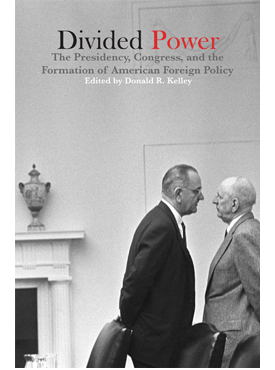Divided Power is a collection of eight original essays written for the Fulbright Institute of International Relations that focuses on timely yet unanswerable questions about the relationship between the executive and legislative branches in the formation of American foreign policy.
In trying to answer questions about what the nation’s foreign policy is, and who has the upper hand in making it, these essays examine the struggle between the constant of the division of powers mandated by the Constitution (ambiguous though it may be) and the ever-changing political realities and conventional wisdoms of the day. Within that context, the authors also examine the society and culture in which those realities and wisdoms are nested.
The goal of these essays is to offer a snapshot in time of the interaction of the executive and legislative branches in the shaping of our foreign policy, framed and informed by the intellectual and political realities that characterize the post–Cold War, post–September 11 world.
Donald R. Kelley is professor of political science and director of the Fulbright Institute of International Relations at the University of Arkansas. His more recent books include The Clinton Riddle: Perspectives on the Forty-Second President, co-edited with Todd Shields and Jeannie Whayne; After Communism: Perspectives on Democracy, editor; and Politics in Russia and the Successor States.
“Answering the ‘Invitation to Struggle’”
—Donald R. Kelley, University of Arkansas
“The President, Executive, and Congress: The Same Old Story?”
—Bert A. Rockman, The Ohio State University
“Authorizing War: Congressional Resolutions and Presidential Leadership, 1955–2002”
—Gary R. Hess, Bowling Green State University
“Intraparty Factionalism on Key Foreign Policy Issues: Congress versus Clinton, 1995–2000”
—Terry L. Deibel, National War College
“Explaining Congressional-Executive Rivalry in International Affairs: The Changing Role of Parties, Committees, and the Issue Agenda”
—Bryan W. Marshall, University of Missouri, St. Louis
“Which Dancer Leads? Foreign Trade Policy Making and Divided Government”
—Ralph G. Carter, Texas Christian University
“Long-Term Trends in Congressional Foreign Policy Behavior: Explaining Variations in Contention in the U.S. Senate in the Past and in the Future”
—Marie T. Henehan, Colgate University
“Seeing Things in Perspective”
—Donald R. Kelley, University of Arkansas

